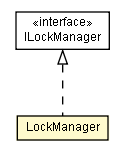
|
||||||||||
| PREV CLASS NEXT CLASS | FRAMES NO FRAMES | |||||||||
| SUMMARY: NESTED | FIELD | CONSTR | METHOD | DETAIL: FIELD | CONSTR | METHOD | |||||||||

java.lang.Objectlumis.portal.lock.LockManager
public class LockManager
Manager implementation for lock-related operations
| Constructor Summary | |
|---|---|
LockManager()
|
|
| Method Summary | |
|---|---|
Lock |
getLock(String resourceId)
Returns a cluster-wide lock object for the specified resource. |
void |
unlockExpiredLocks()
Deletes all the locks that have expired. |
| Methods inherited from class java.lang.Object |
|---|
clone, equals, finalize, getClass, hashCode, notify, notifyAll, toString, wait, wait, wait |
| Constructor Detail |
|---|
public LockManager()
| Method Detail |
|---|
public Lock getLock(String resourceId)
ILockManager
See lumis.portal.lock for details about the consequences of
the lock scope being cluster-wide.
The lock implementation returned does not support conditions. The
Lock.newCondition() method throws UnsupportedOperationException.
If this method is called multiple times with the same resourceId value,
the lock objects returned use a common synchronizing resource. This way,
calling Lock.lock() on any of these lock objects will generate
a lock in the same resource (and these locks will block each other).
But a Lock.unlock() must still be executed in
the same Lock instance on which the lock was acquired, since
it is considered the owner of that lock.
getLock in interface ILockManagerresourceId - the identifier of the resource the lock refers to. It
is recommended to name the identifier using Java class name style
(e.g. com.company.module.etc.MyResource) to prevent naming conflicts on
different implementations.
lumis.portal.lock
public void unlockExpiredLocks()
throws PortalException
ILockManager
unlockExpiredLocks in interface ILockManagerPortalException
|
||||||||||
| PREV CLASS NEXT CLASS | FRAMES NO FRAMES | |||||||||
| SUMMARY: NESTED | FIELD | CONSTR | METHOD | DETAIL: FIELD | CONSTR | METHOD | |||||||||